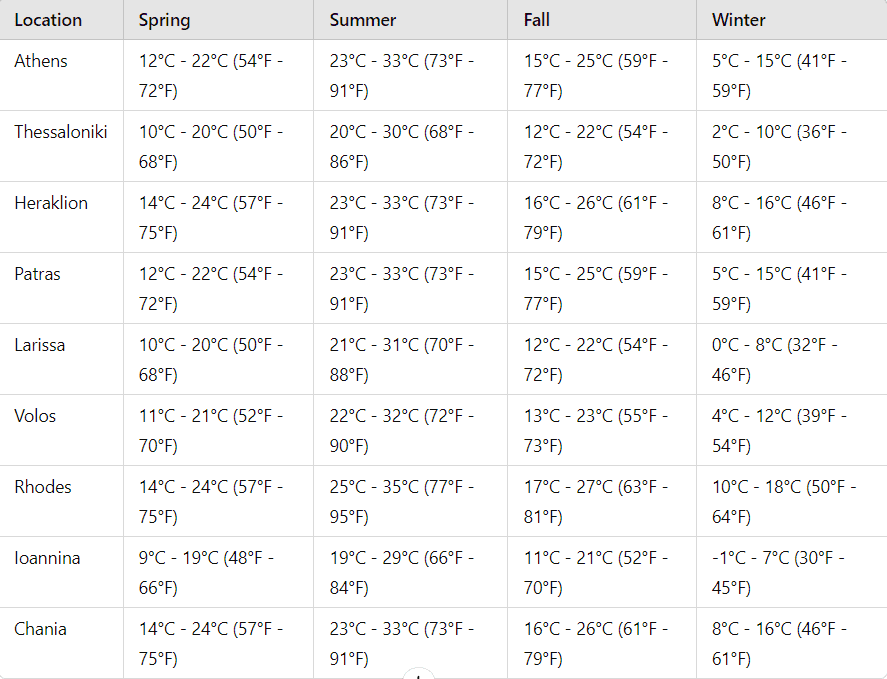Before Your Trip to Greece
As you prepare for your upcoming journey to Greece, we’ve anticipated all your potential questions to guide you through every aspect before you embark on your adventure. Whether you’re wondering about visa requirements, essential items to pack, cultural customs to respect, or how to access emergency assistance, we’re here to provide you with the information you need to feel informed and prepared for an amazing experience. Let’s explore these details together so you can feel fully ready and enthusiastic about your upcoming visit to Greece.
The Weather in Greece

Greece enjoys a Mediterranean climate that varies throughout the year, offering diverse experiences for travelers.
During the summer months (June to August), Greece basks in hot and sunny weather. Temperatures typically range from 25°C (77°F) to 35°C (95°F), and can be even higher in coastal areas and islands. This season is perfect for beach vacations, water sports, and exploring the beautiful Greek islands.
Autumn (September to November) sees a gradual transition from summer’s warmth to cooler temperatures. September remains pleasantly warm, ideal for outdoor activities and sightseeing with fewer tourists. As autumn progresses, temperatures decrease, and occasional rain showers can be expected.
Winter (December to February) in Greece is generally mild, particularly in coastal regions where temperatures hover around 10°C (50°F) to 15°C (59°F). Northern Greece and mountainous areas may experience cooler temperatures and occasional snowfall, making it a quieter time for cultural exploration and enjoying local cuisine.
Spring (March to May) is a vibrant season with blooming flowers and moderate temperatures ranging from 15°C (59°F) to 25°C (77°F). It’s an excellent time for hiking, exploring archaeological sites, and experiencing local festivals as the country springs to life after winter.
The best times to visit Greece are during the shoulder seasons of late spring (April to June) and early autumn (September to October). During these periods, you can enjoy pleasant weather, fewer crowds, and optimal conditions for outdoor activities, sightseeing, and cultural immersion throughout the country.
How to Dress in Greece – Seasonal Considerations
Summer

During the summer months in Greece, the heat can be quite intense, especially in southern regions and on the islands, where temperatures can reach up to 40°C with high humidity. Lightweight clothing such as sleeveless tops and shorts are generally acceptable to stay cool, but it’s advisable to choose styles that are modest and not overly revealing. However, keep in mind that not all regions of Greece experience such extreme heat, so dress according to the specific climate of your destination.
Fall
Fall in Greece brings a mix of temperatures, with warm days and cooler evenings. Layering is key to adjust to these fluctuations throughout the day. It’s interesting how the sun can make daytime feel warmer than it actually is, while evenings tend to cool down noticeably. Additionally, fall tends to be rainier than spring, so having a good quality raincoat handy is advisable to stay dry during occasional showers.
Winter
Winter in Greece is typically the wettest season, characterized by varying temperatures depending on your location. Coastal areas generally experience milder winters compared to inland regions, where temperatures can drop significantly. Packing warm clothes is essential, along with a sturdy raincoat to cope with frequent rainfall. Whether you’re exploring coastal cities or venturing inland, being prepared for chilly and wet conditions will ensure a comfortable winter experience in Greece.
Spring
Spring is one of the most delightful times to visit Greece, with mild temperatures and blooming landscapes. Light jackets, sweaters, and layers are ideal for the varying temperatures. A mix of short and long-sleeve shirts will keep you comfortable as the weather transitions from cooler mornings to warmer afternoons. An umbrella or raincoat is advisable as spring showers are common. Comfortable walking shoes are again essential for exploring Greece’s beautiful cities and countryside.
The Currency in Greece

The currency in Greece is the Euro (€), abbreviated as EUR. Since January 2002, Greece has adopted the Euro as its official currency, replacing the Greek drachma. Euros are used for all transactions, including cash payments and card transactions throughout the country. It’s advisable to exchange currency before your trip or withdraw Euros from ATMs upon arrival for convenience and competitive exchange rates. Many shops, restaurants, and hotels also accept major credit cards, but it’s always good to have some cash on hand for smaller purchases or in case you visit more remote areas where card acceptance may be limited.
Where to Exchange Money in Greece
Tourists can exchange their currency into Euros at several locations,
Banks; Most banks in cities and towns offer currency exchange services. They provide reliable rates and are generally a secure option.
Authorized Exchange Offices; These offices are also available in urban areas and offer competitive rates. They are convenient for travelers needing to exchange cash.
ATMs, Foreign visitors can withdraw Euros directly from ATMs using their international debit or credit cards. This method is convenient and ensures access to local currency as needed.
Tips for Exchanging Money in Greece
Avoid Airports and Tourist Resorts
Exchange rates at airports and tourist resorts are often less favorable. It’s better to exchange money in urban centers where rates are typically more competitive.
Check Exchange Rates
Before exchanging money, it’s wise to compare rates offered by different banks or exchange offices to get the best value. Understanding these currency exchange options will help ensure a hassle-free and financially efficient experience while traveling in Greece.
The Language in Greece
In Greece, the official language is Greek, spoken by the vast majority of the population. Greek has a rich history and is one of the oldest recorded languages in the world, with a unique alphabet and deep cultural significance.
While Greek is the predominant language, English is widely spoken, especially in tourist areas, major cities, and among younger generations. English proficiency is common due to its inclusion in the education system and the influence of tourism and international business.
In summary, Greek is the official and primary language in Greece, but English is also commonly spoken, making it relatively easy for English-speaking visitors to communicate.
The Necessary Documents and Emergency Contacts
Visa and Passport
Visa requirements for Greece depend on your nationality. Most European Union (EU) citizens and citizens of many other countries can enter Greece without a visa for short-term stays (typically up to 90 days within a 180-day period). However, it’s crucial to check the specific visa requirements for your nationality.
Your passport must be valid for at least three months beyond your planned departure date from Greece. It’s advisable to ensure that your passport has at least six months of validity remaining, just to be safe.
Travel Insurance
You must have travel insurance with a minimum medical, evacuation and repatriation coverage of US$50,000 covering all applicable dates of travel with the Tour Operator. This insurance must cover personal injury and emergency medical expenses. On the first day of each Tour, a representative of the Tour Operator will verify that you have sufficient insurance in place. You are strongly recommended to extend your coverage to include cancellation, curtailment, and all other expenses that may arise as a result of loss, damage, injury, delay or inconvenience while traveling. You acknowledge that insurance coverage is not included in the cost of any Tour offered by the Tour Operator, and you are required to obtain separate coverage at an additional cost. It is your responsibility to ensure that you have sufficient coverage and comply with the terms of the applicable insurance plans. You are responsible for advising your insurer of the type of travel, destination(s) and activities included in your booking so that the insurer may provide appropriate coverage.
Travel Vaccines for Greece
Essential Emergency Numbers in Greece
When visiting Greece, it’s essential to be prepared for emergencies. Here are the key emergency contact numbers you should know for your safety and peace of mind:
General Emergency Number: 112 – This number will connect you with police, fire brigade, and ambulance services.
Police: 102 – For non-emergency situations or to report a crime.
Ambulance: 166 – In case of a medical emergency, call for an ambulance.
Fire Department: 199 – If you encounter a fire or need help with fire-related incidents.
Tourist Police: 104 – For assistance with tourist-related issues or concerns.
Vegetarian, Vegan and Gluten-free Eating in Greece

While Greece is renowned for its meaty dishes, it’s actually a haven for vegetarians, vegans, and gluten-free eaters. Fresh produce reigns supreme, making salads, dips, and vegetable-based dishes abundant. Many traditional Greek recipes, like horta (wild greens), fava (chickpea dip), spanakopita (spinach pie), dolmades (stuffed vine leaves), and gemista (stuffed peppers and tomatoes), are naturally vegetarian or easily adapted to vegan. As veganism gains popularity, dedicated vegan restaurants are also emerging, especially in larger cities.
For gluten-free eaters, Greece offers naturally gluten-free options like fresh fruits and vegetables, salads, soups, seafood, and meat dishes (without breading). Gluten-free bread is becoming increasingly available, particularly in larger cities. When dining out, be proactive about communicating your needs, checking menus carefully, and asking about potential cross-contamination. With a bit of planning and communication, you’ll discover a wealth of delicious and satisfying meals throughout Greece, no matter your dietary restrictions.
Do’s and Don’ts in Greece
Do’s
- Do Respect Religious Sites, When visiting churches, monasteries, and other religious sites, dress modestly. This typically means covering shoulders and knees. Women may be required to wear skirts instead of trousers in some monasteries.
- Do Try Local Cuisine, Enjoy the local food, such as moussaka, souvlaki, and tzatziki. Don’t hesitate to try dishes you might not be familiar with; Greek cuisine is diverse and delicious.
- Do Embrace the Siesta, Many businesses close in the early afternoon for a siesta, especially in smaller towns and islands. Use this time to rest or engage in quiet activities, and plan your shopping and sightseeing accordingly.
- Do Respect the Environment, Greece has beautiful natural landscapes. Keep beaches, parks, and historical sites clean by disposing of trash properly.
- Do Participate in Local Customs, Engage in local traditions and festivals if you have the opportunity. It’s a great way to experience Greek culture firsthand.
- Do Practice Good Table Manners, Wait for the host to start eating before you begin, and try to finish everything on your plate. Compliment the cook as Greek hospitality often centers around food.
- Do Use Public Transport, Public transportation in Greece is generally reliable and efficient. It’s a good way to travel around and experience the country like a local.
Don’ts
- Don’t Be Loud and Obnoxious Greeks are known for their hospitality and friendliness, but being loud or disruptive, especially in public places, is considered rude.
- Don’t Show Disrespect to Ancient Sites Don’t touch or climb on ruins, and follow all posted rules and guidelines when visiting historical sites. The preservation of these sites is important.
- Don’t Expect Everything to Run on Time Be prepared for a more relaxed approach to time. Punctuality is not as rigid as in some other cultures, so a laid-back attitude can help avoid frustration.
- Don’t Engage in Political Discussions Lightly Avoid bringing up sensitive topics like politics and economic issues unless you know the person well and they are comfortable discussing it.
- Don’t Refuse Food or Drink If offered food or drink, it’s polite to accept, even if only a small amount. Refusing might be seen as rude.
- Don’t Wear Inappropriate Clothing Avoid beachwear in cities or restaurants. Dress appropriately for the setting you are in.
- Don’t Make the “OK” Sign The “OK” hand gesture, with the thumb and index finger forming a circle, can be considered offensive in Greece.
- Don’t Rely Solely on Credit Cards While major cities and tourist areas accept credit cards, smaller towns and islands may prefer cash. It’s wise to have some euros on hand.
What to Pack for Greece
Travel Adapter for Greece
When traveling to Greece, ensure your electronic devices are compatible with the local electrical standards, which are 230 V and 50 Hz. The common plug types are Type C (two round pins) and Type F (two round pins with earth clips). A universal travel adapter that supports these plug types is the most versatile option, but you can also use a specific adapter for Type C and F plugs.
Most modern electronic devices are dual voltage (110 V to 230 V), but always check your device’s power adapter for input voltage specifications. If your device is not dual voltage, you will need a voltage converter in addition to a plug adapter. Ensuring you have the correct travel adapter and voltage compatibility will allow you to safely use your devices during your trip to Greece.
Wifi Access and Mobile Connectivity in Greece
In Greece, WiFi is widely available in hotels, cafes, restaurants, and public spaces, often for free. Public WiFi hotspots are common but can vary in reliability. For consistent access, consider renting a portable WiFi device.
Mobile connectivity is generally excellent, with major operators being Cosmote, Vodafone, and Wind. Purchasing a local SIM card is a cost-effective option for frequent use, available at airports and mobile network stores. Ensure your phone is unlocked for this. Alternatively, you can use international roaming, but it may be more expensive. Understanding these options ensures you stay connected during your trip to Greece.
In Your Suitcase
- Modest Attire – Similar to Italy, pack clothing that covers shoulders and knees for visiting religious sites like monasteries and churches.
- Lightweight Clothing – T-shirts, shorts, skirts, and summer dresses for warm weather exploration.
- Layers – Sweaters or light jackets for cooler evenings, especially if you’re visiting mountainous areas like Meteora or Delphi.
- Swimwear – Whether for lounging on the beaches of Santorini or enjoying the Aegean Sea.
- Comfortable Walking Shoes – Crucial for exploring ancient ruins in Athens or hiking in places like Crete.
- Sandals – Ideal for warm weather and coastal walks.
- Hiking Boots – If you plan to trek through the rugged terrain of islands or mainland Greece.
- Toiletries – Toothpaste, toothbrush, shampoo, conditioner, and any personal essentials.
- Insect Repellent – Useful for evenings or if you plan to visit rural areas.
- Travel-Size Detergent – For laundry during longer stays or multi-day hikes.
- Electronic Devices – Smartphone, camera, chargers, and adapters to capture Greece’s beauty.
- Health Essentials – Medications, vitamins, and probiotics to stay healthy during your travels.
- Travel Pillow – For comfort during journeys between islands or long car rides.
In Your Daypack
- Hand Sanitizer – Essential for maintaining hygiene, especially in crowded places.
- Prescription Medications – Ensure you have an adequate supply.
- Power Bank – Keep devices charged while exploring ancient sites or islands.
- Travel Documents – Passport, visa (if required), and travel insurance documents.
- Sun Protectio – Sunglasses, sunscreen, and a hat to protect against the Mediterranean sun.
- Light Jacket – In case of cooler evenings or sudden weather changes.
- Collapsible Walking Stick – Useful for hikes or uneven terrain in places like the Peloponnese or islands.










